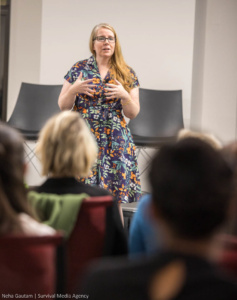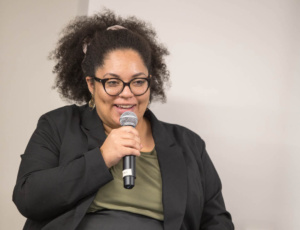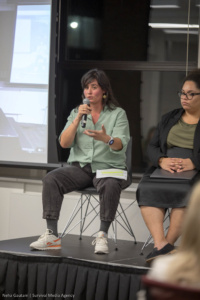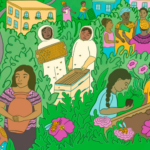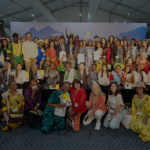The Gender Just Climate Solutions (GJCS) initiative responds to the imperative to value feminist solutions through a variety of programs to identify, showcase, support, and scale community-led solutions that center gender equality within a just approach to climate action.
On 19 September, in the context of the Climate Ambition Summit and NY Climate Week, WEDO was pleased to use the opportunity to do something we had been hoping to do for a long time: bring together key partners working to showcase what gender just climate solutions look like around the world – and how we as a global community can invest in them.
Watch a recap of the event here, and download the GJCS presentation below:
What gender just climate solutions are – and why we should invest in them.
The story of ‘gender just climate solutions’ (GJCS)—and specifically the GJCS Awards Program—began during the Climate Ambition Summit in 2014. At that time, as WEDO and partners worked to respond to a call for submissions from civil society of climate solutions, we were told that our examples of community-led solutions were “too small” to be considered on the global stage.
We know that quite the opposite is true: locally and community led solutions are key for enacting transformative change in our interactions with our environments, our communities, and even within our households.
“A lot of these solutions are women-led – but that’s not the criteria alone,” said Bridget Burns, Executive Director of WEDO. “What does it mean to truly center shifts of power as we think about what climate solutions look like? Some of them are technical – working with solar collectives or clean cookstoves, and doing so in a way that challenges gender norms. A lot of them are also about how we build community resilience; for example, building agroecology in communities and sharing those lessons through capacity building and education. It is also about what it means to command rights and control over resources, and to share those models.”
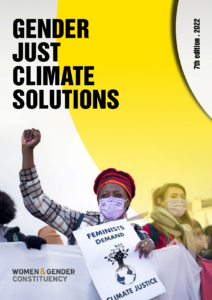 For nearly a decade, we have been working in collective to build a program to showcase what GJCS look like, how they are proven and equitable solutions to the climate crisis, and how they can be scaled and replicated. At this event, we heard from two amazing women leaders: one of whom is using innovative water irrigation systems to help thousands of farmers, another who is reforesting communities while improving women’s livelihoods.
For nearly a decade, we have been working in collective to build a program to showcase what GJCS look like, how they are proven and equitable solutions to the climate crisis, and how they can be scaled and replicated. At this event, we heard from two amazing women leaders: one of whom is using innovative water irrigation systems to help thousands of farmers, another who is reforesting communities while improving women’s livelihoods.
These examples—alongside more than 150 solutions that have been documented from around the world—reveal the impacts of holistic projects that transform communities by integrating conservation, technology, economic justice, capacity strengthening, and women’s leadership.
NEW YORK, NY-- On September 19, 2023, Women's Environmental & Development Organization (WEDO) held an event in New York City-- 'Funding Transformation: An Evening Celebrating Feminist Climate Solutions' Photo by Neha Gautam | Surivival Media Agency
NEW YORK, NY-- On September 19, 2023, Women's Environmental & Development Organization (WEDO) held an event in New York City-- 'Funding Transformation: An Evening Celebrating Feminist Climate Solutions' Photo by Neha Gautam | Surivival Media Agency
NEW YORK, NY-- On September 19, 2023, Women's Environmental & Development Organization (WEDO) held an event in New York City-- 'Funding Transformation: An Evening Celebrating Feminist Climate Solutions' Photo by Neha Gautam | Surivival Media Agency
NEW YORK, NY-- On September 19, 2023, Women's Environmental & Development Organization (WEDO) held an event in New York City-- 'Funding Transformation: An Evening Celebrating Feminist Climate Solutions' Photo by Neha Gautam | Surivival Media Agency
NEW YORK, NY-- On September 19, 2023, Women's Environmental & Development Organization (WEDO) held an event in New York City-- 'Funding Transformation: An Evening Celebrating Feminist Climate Solutions' Photo by Neha Gautam | Surivival Media Agency
NEW YORK, NY-- On September 19, 2023, Women's Environmental & Development Organization (WEDO) held an event in New York City-- 'Funding Transformation: An Evening Celebrating Feminist Climate Solutions' Photo by Neha Gautam | Surivival Media Agency
NEW YORK, NY-- On September 19, 2023, Women's Environmental & Development Organization (WEDO) held an event in New York City-- 'Funding Transformation: An Evening Celebrating Feminist Climate Solutions' Photo by Neha Gautam | Surivival Media Agency
NEW YORK, NY-- On September 19, 2023, Women's Environmental & Development Organization (WEDO) held an event in New York City-- 'Funding Transformation: An Evening Celebrating Feminist Climate Solutions' Photo by Neha Gautam | Surivival Media Agency
NEW YORK, NY-- On September 19, 2023, Women's Environmental & Development Organization (WEDO) held an event in New York City-- 'Funding Transformation: An Evening Celebrating Feminist Climate Solutions' Photo by Neha Gautam | Surivival Media Agency
What feminist funding looks like – and why we need more of it.
As we have advocated for GJCS over the last decade, we have also recognized that we must also continue building an ecosystem of feminist funding that can move resources to communities at the scale required.
“When speaking to those on the frontlines, it’s not always about millions – it’s sometimes about thousands,” said Razan Al Mubarak, UN Climate Change High-Level Champion for the leadership team of COP28 UAE. “We need to challenge funding and finance mechanisms, not only their scale but how they get to those who need it most.”
A panel of experts highlighted “key ingredients” of such existing feminist funding mechanisms, including providing flexible, multi-year funding and facilitating the access and connection to build political power. Some key issues that surfaced include:
Diversity of scale.
As we seek to increase the overall funding available for feminist climate action, we must also consider how funding mechanisms can support a diversity of grant sizes to organizations working at a variety of levels, as all efforts are necessary to limit warming to 1.5 degrees and transform our world to be healthy and resilient.
“The GJCS Scale Fund builds on decades of feminist mobilizing for climate solutions to provide access to direct funding opportunities for solutions to scale up current programming and offers technical assistance to address institutional capacity, such as proposal writing and developing communications materials,” said WEDO Program Manager Alex Gordon. “The small re-grants are intentionally flexible and need-driven, supporting various activities from communications and administration to media support. Our hope [with the Scale Fund] is not only to provide an infusion of funds but to work with practitioners in identifying and addressing their barriers to scaling so that our advocacy, as part of our feminist networks, is better informed and targeted.”
Inclusive governance models.
The importance of governance models that truly shift power dynamics – including via funding the leadership of communities and their activism – was named repeatedly throughout the conversation. Consistent, trust-based relationships are crucial for seeding access and connection, leading to sustainable solutions.
A transformative learning agenda.
Feminist funding includes providing resources to be generative in creating solutions and learning together with partners – including by funding convenings to share knowledge.
“We’re trying to build a model of experimenting and challenging the power [of traditional philanthropy],” said Maria Alejandra Escalante, representing the Funder Learning Action Collab (FLAC). “For what reasons? So we can actually direct resources to scalable, transformative, systemic, rooted, collective, political, intersectional, justice-centered initiatives needed at the nexus of environmental and climate justice and gender equality.”
Breaking down silos.
Cross-sectoral, cross-movement collaborations were highlighted as an important area of investment and attention. Our shared feminist analysis, encompassing all intersecting justice narratives, can be used to subvert the structures of white supremacy and patriarchy that often silo movements to limit their effectiveness.
“It’s very important that we start to de-silo how we think about: what is climate – what is climate funding and advancing climate justice – and make connections that to be honest those in power don’t want us making,” said Divya Sooryakumar, Director of Grantmaking at MADRE.
As we continue to champion gender just climate solutions and rally for the feminist funding they deserve, we hope you will join us and all our collaborators in celebrating climate justice that centers gender equality and transforming current funding paradigms.


